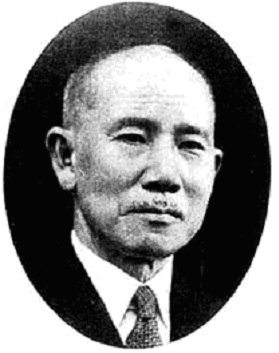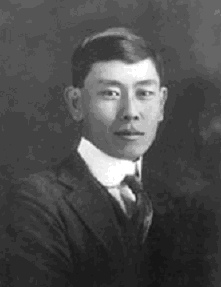Yoshio Mayumi & Yasuo Mayumi
In 2004, the Jefferson County Commission voted to change the name of “Jap Road” to “Boondocks Road.” The decision came after a decade-long controversy in the county, which was prompted by advocacy groups led by Beaumont schoolteacher Sandra Nakata, a descendant of the Tanamachi family.
“‘Jap’ has always been derogatory and offensive. . . . It’s unbelievable that people are fighting (a name change),” Nakata said in a Los Angeles Times article. Indeed, many of the Jefferson County residents had preferred to keep the name, despite the use of the slur, since behind it lay the history of two locally-famous Japanese men: the Mayumi brothers, Yoshio and Yasuo.

Born in 1874 in Mie Prefecture, Yoshio Mayumi went on to study at Keio Gijuku (now Keio University), where he was inspired by Fukuzawa Yukichi’s notion that Japan needed to break out of isolation and catch up with the West. After graduating in 1895, Yoshio became a wealthy banker, landowner, and member of the Japanese parliament. He came into contact with Japanese officials who informed him of the potential for rice farming in America, and in 1904, Yoshio, along with Shinpei Maekawa and others, visited Texas to survey the land.
Having decided that the land was ideal for rice farming after this initial visit, Yoshio returned to Texas in 1906. He purchased 1,734 acres of land near Fannett and brought along eight men as contract laborers – seven more would join the next year – as well as his younger brother Yasuo. In the early years, the farm was fairly successful. In 1908, the Mayumis harvested 7,500 sacks of rice and raised a large number of livestock. However, the farmers were not satisfied with the poor working conditions and the hot, humid climate. Many of them left the farm after their contracts expired. By the summer of 1909, the Mayumi farm only had four Japanese farmhands, and most of the work was done by local labor.

Still, the Mayumi brothers were popular in the Fannett community, whose initial suspicion of the Japanese men gradually turned into respect. It is said that the Mayumi brothers were friendly and hospitable: visitors could always come by for a drink and the brothers would even host community dances. The road leading up to their farm was named “Jap Road” – the word “Jap” not yet a slur for Japanese people at the time.
"The Mayumis would introduce themselves as ‘the Japs from Jap Road.’ We admired these kind and gentle men,” said Ima Thornton, a Fannett resident who was against changing the road’s name, in 1993. The Mayumis would receive help from the community as well. In 1917, Yasuo’s wife, Toshiko, who had come to the US as a “picture bride,” gave birth to an infant that died after only one day. The Wingate family came to comfort the Mayumis and help prepare the baby for burial.
Despite the admiration from the community, the success of the Mayumi brothers did not last much longer. In 1915, their father died, and Yoshio returned to Japan at the request of his mother, entrusting the farm to Yasuo. However, mismanagement of the farm led to smaller harvests. The collapse of the rice market after World War I combined with the rising hostility towards Japanese people, which culminated in the 1924 Immigration Act, drove Yasuo to leave. The Mayumis decided to sell their farm to the Burretts in Fannett and returned to Japan. Still, if the debates over “Jap Road” tell us anything, it is that their contribution to the local community lives on in Jefferson Country.
